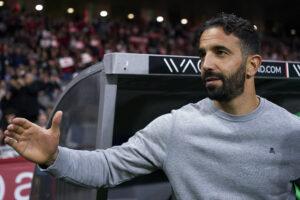Alan Hansen once said: ‘You can’t win anything with kids’. The infamous saying has gone down in history as one of the former pundit’s poorest pieces of judgement. Though he was proved wrong, it seems that these days, no one wants to play the ‘kids’.
The Problem
Manchester City and Chelsea are England’s two best examples of success at youth level. The players they develop are of a very high standard and they showcase their talents on the pitch. Elsewhere in Europe, when one looked at Barcelona in particular, their talented youngsters used to transfer from the B team to the first-team. There was a connection between the respective levels; Lionel Messi began his career in with the Barcelona C team before working his way up the alphabet and into the first-team squad.
Premier League teams are fearful to promote their youth. Managers at teams traditionally battling it out at the summit worry about taking risks that could mean they miss out on a Champions League spot. They worry because of the brutal nature of modern day football; managers can be sacked almost instantly if they do not start in a promising fashion. With the hundreds of millions of pounds afforded to Premier League sides, the temptation to buy has become a necessity.
Potential Solutions
There should be a way to measure a club’s success at youth level and for it to have an effect on the first-team dealings. For example, if Manchester City fit a criteria which indicates a plethora of achievement from their youngsters in a particular season, they should have to fill a quota whereby a fixed number of their youth players have to be in a match-day squad.
It is quite obvious not everyone has the facilities that some teams do. Many teams do not have the luxury of academies. To balance this, quotas would be lowered according to each team’s need.
Alternatively, a slightly less popular measure which would be budget restrictions. Clubs that fit the ‘success’ criteria would see strict sanctions on their transfer budget. This isn’t as harsh as it seems, because they would still be holding some of the country’s most talented prospects within their grasp.
Of course, this motion is hypothetical and that’s all it will ever be. The Premier League is the most popular league in the world because of the money that is pumped around it to bring in Europe’s hottest talents. The men who benefit from the Premier League’s financial clout aren’t interested in youth talent; they want expensive imports to boost the marketability of the division.
A Closer Look
Manchester City
City, formerly under Patrick Vieira and now under Simon Davies, have an academy setup mirroring the philosophy of current manager Pep Guardiola. It was focused in this way, years before they brought in their current manager. The likes of Angus Gunn, Pablo Maffeo and Alex Garcia are examples of players who are integrated into the possession-based game and are now waiting for that opportunity to prove their worth. The one major advantage they have is that experience. You can’t buy experience. Some players brought in will have to adapt to the manager’s style and that could take time.
City could spend £100 million on goalkeepers and still be dissatisfied. The ball-playing ‘keeper which Guardiola wants is a very specific type of player, the kind of which may not always be suited to the Premier League (e.g. Claudio Bravo). Angus Gunn is an exception. He is initiated in the style, is a fine shot-stopper and has the necessary physique. It would take guts to favour him over bringing in a new signing in the summer, but there is no doubt that Guardiola is a manager who is willing to take risks. Unfortunately, with a seemingly unlimited budget, it’s highly unlikely that he won’t choose to spend instead.
Chelsea
Last season’s UEFA Youth League and FA Youth Cup trophies were but mere cherries on top of the fruitful Chelsea development cake. Jacob Maddox, Tammy Abarham and Kasey Palmer were three of the stand-out performers for the Blues in that campaign. But the question of what will happen to them remains a mystery.
Chelsea have been a conveyor belt for developing talent. Ruben Loftus-Cheek, Nathan Ake and Nathaniel Chalobah are some of the best-known names but their progression through to the first-team seems unnecessarily challenging.
Loftus-Cheek has been described by some as the complete midfielder; with pace, power and technical ability it’s hard to argue with the plaudits. It seems obvious for him to take Nemanja Matic’s position next to N’Golo Kanté in central midfield, but it seems Tiemoue Bakayoko of Monaco is being lined up instead. Bakayoko has been an exceptional powerhouse for Monaco this season, but would it not pay dividends for Chelsea if one of their own talents were to make it at the top level?
Monaco and Southampton
Ironically, it is Monaco who are the perfect model for youth. With a careful combination of in-house development and shrewd transfer negotiations, they have blossomed. Other clubs can only look on in admiration and envy. Admiration for their fine domestic and European achievements; envy because they have done it without spending large amounts.
The French outfit are similar to Southampton to an extent. The Saints have a similar strategy of blooding through talents themselves and scouring the shores for rough diamonds. Over the years, Gareth Bale, Nathaniel Clyne, Adam Lallana, Luke Shaw and many others have risen to stardom down south and they are the shining examples of a terrific academy. Who is to say that these players aren’t available at the ‘bigger’ teams?
High-stakes
Talk of giving youths a chance on a large-scale is merely this. Real Madrid are the complete antonym. Steeped in monetary arrogance, owner Florentino Perez gets more pride in acquiring a developed player for mega-money than he does singing a raw talent for pennies and watching him develop into a superstar. He thinks because he has the ability he should flaunt his coins, his notes and his check-book around to the envy of other clubs.
A never-ending game of higher-or-lower ensues, and higher wins every time. You get the sense that his attitude transpires in the Premier League. When Roman Abramovich first came to England, you could see his desire to be the financial monopoliser.
It’s not just Perez who is at fault. Modern day football clubs as a whole are far too infatuated with the capital at their disposal. Like morphine is a quick-fix to numb pain, a quick cash splash can solve numerous problems.
Frustrating future
Financial Fair Play was a unanimous disaster and it’s doubtful there will ever be sanctions to cut the spending in football. It’s doubtful the FA will resort to such dramatic measures as forcing teams to play youth players, so it will take an adoption of common sense from clubs to plan for long-term success. It is one thing to plan, though; the bigger step is to buy into that plan. Many big teams have great academies, but fail to use them properly.
Main Photo






